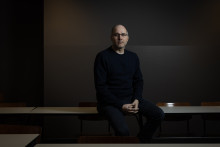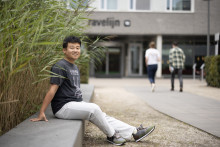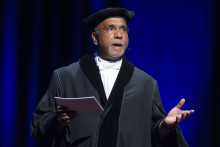On the edge of the campus, surrounded by meadows and woods, master's student Behnaz Afshani (25) makes tea in the small kitchen of her flex studio. Three weeks ago, she got the key. The narrow steel containers, stacked in five layers around a courtyard full of bicycle racks, are not the most idyllic homes around the University of Twente, but the Iranian is happy with them. The library where she studies every day is within walking distance and the rent is affordable, she says. ‘I've been very lucky!’
Between a houseplant and the table lamp, a tube of vitamin C is ready for the bleak autumn months. In the coming period, Afshani will be working on her master's thesis in Business Information Technology. Enthusiastically: 'For a company in Twente, I'm designing a method that allows cloud-native companies, i.e. companies that store all their work in the cloud, to set up a digital business architecture.'
International in twente
Politicians are calling for a reduction in the number of international students and English-language education at universities. But how does it really feel to leave your home country for a study or academic career in the Netherlands? In this triptych, journalist Minou op den Velde talks extensively with internationals at the University of Twente, about their backgrounds, dreams and cultural differences on campus. This is episode 3 (the last one), with master's student Behnaz Afshani *.
Afshani came to the Netherlands from Iran in early January 2023, as tens of thousands of compatriots marched through the cities in protest, united in their disgust with the Islamic republic's oppression. It was a courageous response to the violent death of 22-year-old Mahsa Amini, who died in a cell on September 16, 2022, after being arrested by the morality police for allegedly not wearing her hijab correctly. The country's supreme leader, Ayatollah Khamenei, responded to the uprising with torture, kidnapping, and executions. Now, more than two years later, failure to comply with dress codes is punishable by fines, imprisonment, educational restrictions and travel bans.
It is not difficult to see Afshani's choice to study in Twente as an escape from an unfree life, but she will never say that out loud herself. ‘I have a lot to say, but I can't talk freely,’ she says, with an apologetic smile. ‘It's not safe to speak out, as long as I want to be able to visit my family in Iran.’ In the two hours that we talk to each other, she will repeat these phrases several times, because in Iran everything is political. From faith and love to how you spend your free time. Wherever you are in the world as an Iranian, you cannot escape the scrutiny of the homeland.
Afshani grew up in the southwest of Iran, in the cultural metropolis of Shiraz, one of the five largest cities in the country with one and a half million inhabitants. Until the age of seven, she lived with her parents, together with her maternal grandmother. ‘My grandmother was like a second mother to me. We lived upstairs and she lived downstairs. In the morning she would take me to daycare, in the afternoon we would have lunch together and she would take me to music lessons, or we would play in the park.'
Afshani's mother works at a blood bank, her father is on the road a lot as an engineer, Afshani recalls. 'The upbringing mainly came down to my mother. I have a closer relationship with her, because she is a bit more open-minded, and my father is very strict. From an early age, his main message was that I had to study harder so that I could go to the best high school.’
'I was constantly under pressure. Because I knew: this is one of the better schools, if I am expelled from here I will not be able to go to a good university'
Were you also under pressure at school?
'Absolutely. Teachers in Iran are friendlier to students who perform better, and some try to scare their students. For example, we had to stand up when a certain teacher walked into the classroom, otherwise she would start screaming. Another teacher sometimes continued the lesson during the break. I was constantly under pressure. Because I knew: this is one of the better schools, if I am expelled from here I will not be able to go to a good university. From that moment on, I was stressed. I got heart palpitations and cold hands.' Afshani looks at me. 'To be honest, I also find this interview very overwhelming.' She is silent for a moment. ‘Sorry, I don't know why I'm laughing now. Because it's kind of sad. I don't have self-confidence.’
How did your parents deal with that?
‘I've never been able to talk to my parents about personal matters. The high school graduation was so difficult that more than half of my class failed. The whole summer I was studying for my re-exam. When I graduated, my mother confessed that she felt guilty for sending me to that school.’
In 2016, Afshani started her bachelor's degree in computer science. A logical choice, it seemed, because she started taking computer lessons as a five-year-old. 'But I had a lot of doubts about my choice of study', she chuckles. 'Many students in Iran have no idea what they want to become, because the education is mainly theoretical. We hardly get any practical assignments. I liked math, but I didn't want to go into medicine. That's how I ended up with computer technology. In high school, I quickly realized that I don't like programming, but I did love IT. We had a nice teacher, who gave us assignments to analyze the SWOT - Strengths, Weaknesses, Opportunities, and Threats - of companies. With a number of classmate friends, I was able to participate in a startup. We wanted to develop an app that would make it easy for people to meet up for an activity or event. I felt the need for that myself, because as a student in Kerman I hardly knew anyone. That's how I discovered that I like to come up with innovative ideas.'
You came to the Netherlands in January 2023. How did that choice come about?
'I was planning to work in Iran after my studies. But university education turned out to be just as theoretical as high school. In Twente, we work together with companies outside the university for most courses. You don't get that kind of practical experience in Iran. Fellow students tried with all their might to gain some knowledge through online courses. Most students copied each other's homework, and so did I. The projects at my university were the same every year, and we regularly copied from each other. A friend even told me the other day that her teacher had recited the answers during the exam, and that the whole class had been writing it. Can you believe that? After my bachelor's degree, I had no idea where I could work. Because I had good grades, but I hadn't learned anything. I thought, 'Why should I stay in Iran?'
Did you also want to leave Iran because you can't live as a woman there as freely?
Afshani smiles. 'I'd love to tell you about that, because I've been through all kinds of things, but I don't dare.'
Perhaps I can ask it this way: what does the inequality between men and women in Iran mean for your professional opportunities as a woman?
'I know quite a few people who seriously think that women are less intelligent and capable than men. The oil company where my father works doesn't even employ any women at all.'
Afshani brushes back her long black hair. She no longer wears the hijab that is mandatory in Iran. ‘My grandparents are Muslim, but when my grandmother asked if I had prayed, I would always say, 'No!' Then she said: do it, and I'll buy you a present. ‘Okay, fine!’ Afshani sighs. 'I believed mainly because it was demanded at school. In high school, we were required to pray. There was a small mosque on the school grounds and during recess it was checked whether you were present. That was the only time I prayed. Our math teacher forced us to memorize parts of the Quran. If we made a mistake, we were expelled from class.'
Why did you choose the University of Twente?
'I was also accepted at an Austrian university, but I had the feeling that there are more jobs in my field in the Netherlands, and that people here speak better English than in many other European countries. I considered studying business administration, but my father didn't think that was a good idea. He said: ‘In most countries, companies hire their own compatriots because those people speak the language. That's when I started looking for other programmes. I loved the major at Twente, because it combines business administration with IT.'
What do you remember about your first days in Twente?
‘Cycling in the rain and the bad food! In Iran, you eat warm meals in the afternoon, usually rice with stewed vegetables, and in the evening you don't eat much. Here it's the other way around and you get a cheese sandwich for lunch. By now I'm used to it. Sometimes I even crave a piece of cheese! The biggest culture shock for me was the opening hours. In Iran, shops close at about ten o'clock. In the Netherlands, everything is closed on Mondays, and at six o'clock everything closes, even some cafes. I thought it was so weird, I thought: how? Do I just have to go home and starve?’
'I had the feeling that I wasn't good enough and that I could be kicked out of the programme at any time'
Did you feel welcome on campus?
'Yes, although I didn't expect that. I thought, Iran is a developing country, people must think I'm very weird, they probably don't want anything to do with me. Most people turned out to be very social and helpful. I came here at the beginning of January to take care of some practical matters, but the university had already arranged everything for me. The campus is lively, I never feel alone here, except in the summer. As soon as everyone goes on holiday or goes back to their home country, campus life dies out.'
What did you do to feel at home?
'I participated in the Kick-In, the intro programme for new students, and I had a lot of help from another Iranian student. Before I came to the Netherlands, I followed a university page on Instagram. Because he was tagged, I saw that he was following me, and I discovered that he was also from Iran. I asked him some questions about my visa and when I came to Twente we became friends. He showed me all the buildings on campus, explained how public transport worked, and told me where I could do my shopping. That was very nice.'
'But the first six months in the Netherlands were tough. All classes were in English. In high school I had been taught English, and I had tutoring, but that was mainly about grammar, you hardly learned to speak it. At the university in Iran, all classes were in Persian, we hardly read any English-language studies. But in Twente we speak English all day, and to get a residence permit you have to pass the IETLS test to show that you have mastered English. That was tough. The Dutch education system was very different from what I was used to, it was hard work to get everything done. I had the feeling that I wasn't good enough and that I could be kicked out of the programme at any time. At that time, I fell into a depression.'
What were your days like during that period?
'I remember very well that the dishes kept piling up. With the greatest difficulty I managed to wash a plate before eating. From early in the morning until late at night I sat in the library studying, just to have something to do. But I couldn't focus. I didn't understand what I was reading, I couldn't process the information. I got bogged down in details or got stuck on the meaning of certain words. Slowly, I turned around. I kept failing exams, and the more often that happened, the more afraid I became that I wouldn't pass the next exams. I didn't dare tell my friends. People advised me to ask teachers for help, but I'm too insecure for that, and in Iran I was afraid of my teachers. When I came here, I thought wow, I can just call teachers by their first names, how friendly they are! But I still find it difficult to talk to teachers just like that. I'm always nervous when I have an appointment with them.’
A doomsday scenario arose in your head.
'What played a role is that international students have to obtain half of their credits in order to be allowed to stay in the Netherlands. I had panic attacks, I thought if I don't make it, I'll be deported from the country. I considered dropping a course, because I had missed half of the lectures, and in the end I only had half a day to study the exam. My friends persuaded me to try it anyway. Miraculously, I made it.'
Do you have any tips for internationals who are struggling as you were in the beginning?
‘If you need help, let people know. Don't be ashamed to ask questions. Every programme has study advisors, and there is a therapy centre in the Vrijhof, where you can also attend workshops on mindfulness and dealing with stress.'
How did you get out of your depression?
'I started with antidepressants, which I still use. With therapy, I try to figure out why I'm constantly stressed. I'm still with my Iranian therapist, but online. I've found that I treat myself just like my dad used to, but worse. For example, my father wants me to get up early to study. I found that every time I woke up after eight in the morning, I got mad at myself. Like: why are you only awake now, why are you sleeping so much?'
Even though you live here now, your father still talks to you, so to speak, but in your head.
'Sometimes, yes. It was hard to get rid of that. Every time my therapist brought up my father, I couldn't get mad at him, but I got mad at her. After a few sessions, I started to wonder how that went when I was little, because most problems come from your childhood. I've often asked my dad why he's so strict about my studies, and he always says, ‘I'm only doing that because I love you. I want you to be successful.’ Even when I was sick in bed here, he called me to rile me up. My father knows exactly when I have which exams, and the night before each exam he texts me to ask if I've studied enough.' Afshani bursts out laughing. ‘I'm telling him too much! My therapist helped me to see that as a human being I am separate from my father, and that I shouldn't treat myself the way he does. I still sometimes feel like I'm worthless, but slowly things are getting better.'
Afshani stands up and offers a glass of water. She studies during the week, but on weekends she goes out, she says. She has already explored all corners of the Netherlands by train, from Groningen to Gulpen. 'I love just walking down the street in a new place.'
In her bedroom, homesickness whispers. Next to her bed is a soft yellow carpet from Iran, on the table is a stone jewelry box. 'I used to pay no attention to traditional handicrafts, but now I love it. I also miss the language, and the poetry.'
Last summer, she was back in Iran. ‘It was so good to see my grandparents, I miss them so much. A year ago, my maternal grandfather passed away. I knew he was sick, but when he died I was in the Netherlands. I read it in the family group chat, it was so miserable. I was sitting with my friends in a café in Amsterdam, and I immediately walked out. I cried out loud on the street.'
In early October, Iran launched 180 missiles at Israel, and Afshani worries about an impending war. ‘My family is safe, but those missiles were launched from Shiraz, my parents heard them go off. It’s tense, I just hope it ends well, because in these kinds of political conflicts, innocent people are always the victims.'
Against the wall are two guitars – they belong to her partner, who is also studying in Twente. Afshani has a bevy of friends on campus. She got to know most of the people through associations. 'I also started taking up zumba classes right away. Dancing is the only thing that doesn't make me feel stupid and insecure. In Iran we don't have any student associations or dance associations, because as a woman you are not allowed to dance in public. With my mom and my friends, we often imitated dance videos online, but only in the house or in our backyard. When I was studying in Kerman, which is quite a religious city, my dance teacher was arrested for posting a few dance videos on Instagram. She had to erase them all.’
What do these kinds of rules of conduct mean for Iranian student life?
'That differs from one university to another. I was in a strict university, we had to wear a uniform. In class we were allowed to sit next to male fellow students, but outside you had to be careful. I was once on campus talking about a school assignment, with a girl and a boy from my class, when security guards from the university came to check on us. They asked, 'What are you doing here? Do you have a student card?'. Our laptop was open, we just sat there, but it was getting dark. In Iran, it is not allowed to date before marriage. An innocent conversation about a school assignment is already suspicious.'
Did you have to get used to the looser manners in the Netherlands?
'Well, it's different. When I arrived here, I thought: there is a lot to do here. In Twente, every study quartile ends with a free jazz party, which is great. You can do all kinds of creative workshops there. The last time, students from Asia sold homemade meals. In Iran, women are allowed to go to concerts, but only male singers perform. Women are not allowed to sing in public. At a concert, we can only sit still and clap, and drinking alcohol is prohibited.'
'I want to stay in the Netherlands and find a job here'
Does more freedom mean that you got to know yourself in Twente in a different way?
‘I'm so far away from my own country, and from my father, that I feel like I don't have to take life here so seriously. Whereas before I was always preoccupied with: what if something goes wrong or fails? I was afraid that I would never find a job, because I had no work experience, I had only worked for a charity for two months. I think it's great that teenagers in the Netherlands have a part-time job from the age of 16. In my time, that was not common in Iran. Many Iranian parents said: I don't want my daughter to work in a café, what will people say?'
What does your father think of the fact that you can live so much more freely here in the Netherlands?
‘My parents are worried that something will happen to me here. I fell off my bike twice and my mom burst into tears because I was covered in bruises. My father thought I should wear a helmet, but I don't do that, no one does that here. I know my parents miss me, I miss them too. But for the sake of my future opportunities, they would rather I live here than there. I want to stay in the Netherlands and find a job here.'
Would you like to apply for Dutch citizenship in the long term?
‘I can't talk about that, sorry.’
Has life in the Netherlands changed you?
'I matter more as a human being here, I feel like people respect me. If I have a problem with my bank account in Iran, I am often treated unkindly in a bank establishment, and it can take a long time to resolve. Here you will be kindly helped. If you want to go to the doctor in Iran, they say: 'Just come.' Then the waiting area is overcrowded and you have to wait endlessly. If you go to the doctor in the Netherlands, you can make an appointment. Little things like that save a lot of frustration. I have the feeling that it is easier for me to get ahead in life in the Netherlands. I feel more capable here. Before, I always thought: what if? What if my thesis fails, what if I don't find a job? The other day I was looking back on the time I've been here, and I thought: wow, I've come so far. I've found an internship, I've found a part-time job, and now I'm working at a company on my master's thesis. I never thought I'd be able to do all that, and now that it's happened I feel very proud.’
* The name Behnaz Afshani is a fictitious name for security reasons. Her real name is known to the editorial team.







